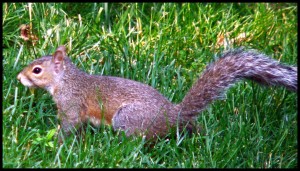READY TO GET STARTED?
REQUEST A FREE ESTIMATE
Fill out the form below or call (888) 466-7849 for a free, no-obligation estimate.
Squirrels are cute when they’re running around outside but are not so cute when they’ve entered your home. Squirrels are difficult to control because of their ability to enter small and high spaces. They are known to get into houses by using tree limbs and even power lines to squeeze their way into the smallest openings, chimneys, or vents. Once squirrels are inside they can cause significant damage and contaminate your home.
Squirrels can cause considerable damage to your property. Their gnawing can damage wires (leading to power outages and potential house fires), holes in the structure (allowing other pests/rodents entry into the home) and damage or contaminate insulation. They can invade and damage items that you may have stored away, including storage boxes and their content. Outside items like electrical boxes and phone cables can also become a victim of squirrel damage.
In addition to property damage, squirrels can contaminate your property. Contamination from their fur, urine, and droppings can damage insulation, items in storage, electrical wiring, among other things.
Although squirrels are a threat all year, the cooler months, when they seek warmth and shelter, are a main concern. Prevention is the key to squirrel control:
Watching from your kitchen as squirrels and other wildlife run around the back yard can be amusing, but finding these animals frantically scurrying in your attic or garage is anything but funny. Northwest Exterminating wants to remind homeowners to be aware that all kinds of nuisance critters are looking to stay warm this season and may try to gain access to the home.
Finding any wildlife in your home can be an unpleasant experience. It is important to remember that these animals are wild and shouldn’t be handled without the help of a professional animal removal company. In fact, they can bite, claw or scratch if they feel threatened and you don’t know if they are harboring a disease.
Homeowners should do a careful check along the outside of the home to close up any gaps or entry points. The National Pest Management Association (NPMA) recommends the following tips to specifically keep nuisance wildlife in the great outdoors where they belong:
For more information on wildlife animal removal and how to protect your home, visit www.callnorthwest.com.
Source: PPMA
 Ladybugs Seek Warmth in Homes
Ladybugs Seek Warmth in HomesLadybugs are beneficial insects but when they overwinter in your home they become a nuisance pest. They spend the warmer months of spring and summer growing their populations and like other overwintering pests, they seek warmth from the cold temperatures in fall and winter. Many seek shelter under rocks, leaves, or other items found in nature, then you have those that find shelter in homes and buildings.
Although typically harmless, ladybugs can aggravate asthma and cause allergic reactions in people. They can also emit a foul smelling, yellowish fluid that can stain surfaces.
Keeping ladybugs out of your home starts with the usual preventative pest management steps that we typically cover in our blogs: screen all windows, keep doors closed, door sweeps on exterior doors, and seal all cracks and crevices around the exterior of the home (windows, doors, pipes, etc).
If ladybugs have already found their way into your home, use a vacuum cleaner to clean them up. Empty the vacuum bag into a trash bag and make sure it is tightly closed. Discard of the trash bag in a sealed outside container. If you have a ladybug infestation, call a professional pest control company to evaluate, assess, and treat the problem. Call Northwest Exterminating for more on ladybug pest control.
In our last blog we discussed the potential health threats and property damage that animals can cause when they enter your home. We’re not talking about dogs and cats here, we’re talking about the animals that belong in the wild: bats, raccoons, squirrels , mice, opossums, and other wildlife. With the cold temperatures we are starting to experience, it’s a prime time for wild animals to seek warmth and shelter in homes.
Here are some helpful tips on how to keep wildlife out of your home:
If you hear wildlife in your home, it is best to call a professional animal removal company. Some animals can get aggressive when they feel they are being threatened. Northwest’s wildlife control specialist can help to remove the animal, seal off entry points, and help you to ensure that other wildlife do not return.
Those furry little creatures are cute outdoors but they somehow turn into scary monsters when they’re scurrying through your attic, basement, or even your walls. During the fall and winter months different wildlife can make their way into houses seeking warmth from the outside cold.
 Common invaders like squirrels, bats, raccoons, and possums can be a threat to your health, property, and even your safety. These animals can carry diseases and can even get aggressive when they feel threatened. They can damage your property by gnawing on sheet rock, wood, insulation, storage containers, and wiring (a potential fire hazard).
Common invaders like squirrels, bats, raccoons, and possums can be a threat to your health, property, and even your safety. These animals can carry diseases and can even get aggressive when they feel threatened. They can damage your property by gnawing on sheet rock, wood, insulation, storage containers, and wiring (a potential fire hazard).
There are easy steps to take that will help keep animals out of your home for the colder seasons: take trash out regularly and seal tightly and cut back tree limbs from your roof line. Animals, especially squirrels, use tree limbs as an entry to your home. Look for gnaw marks and feces and listen for scurrying sounds as indicators that you may have unwanted guests in your home.
Because these animals have a potential to be dangerous, it is best to call a wildlife removal company to properly remove these animals. Call Northwest Exterminating for animal removal.